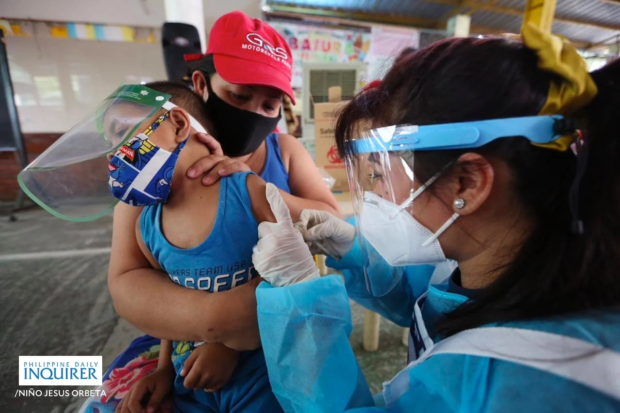PH confidence on vaccine for kids declines by 25% — Unicef

Children get free vaccine against measles-rubella and polio in Quezon City. FILE PHOTO/NIÑO JESUS ORBETA/PHILIPPINE DAILY INQUIRER
MANILA, Philippines — The public perception of the importance of vaccines for children in the Philippines declined by 25 percent during the COVID-19 pandemic, according to a report from the United Nations International Children’s Emergency Fund (Unicef).
In a global report, Unicef warned that a total of 67 million children missed out on vaccinations between 2019 and 2021, 48 million of which did not receive a single routine vaccine, tagged as “zero-dose.”
The report also showed vaccine confidence declined by about 25 percent in the Philippines and more than a third in the Republic of Korea, Papua New Guinea, Ghana, Senegal, and Japan after the COVID-19 pandemic began.
“The Philippines has one million zero-dose children, the second highest in East Asia and the Pacific Region, and the fifth highest globally,” Unicef said.
“Vaccine confidence is volatile and time specific. Additional data collection and further analysis will be required to determine if the findings are indicative of a longer-term trend,” it added.
Despite this, Unicef reported that the overall support for vaccines remained “relatively strong,” with 80 percent of respondents in almost half of the 55 countries studied perceiving vaccines as crucial for children. However, it also warned that the threat of vaccine hesitancy may be growing.
“These factors include uncertainty about the response to the pandemic, growing access to misleading information, declining trust in expertise, and political polarization,” said Unicef.
“In the Philippines, vaccine hesitancy can be attributed to cultural factors, and concerns on vaccine safety,” it added.
Unicef noted that only China, India, and Mexico showed that the perception of the importance of vaccines remained firm or improved, while most countries indicated that people under 35 and women were more likely to report less confidence about vaccines for children.
DOH concurs with findings
Meanwhile, the Department of Health (DOH) on Tuesday expressed concern over Unicef’s report on Tuesday, stressing how it could affect the country’s public health, especially concerning measles and polio.
“We concur with these findings dahil noong kami ay nagkaroon ng paguusap in a meeting with WHO [World Health Organization] experts, kami po ay tinutulungan ng WHO and UNICEF at naipalawang nila sa amin itong mga reports na ito, galing po sa iba’t ibang talaan na meron tayo,” said DOH officer-in-charge Maria Rosario Vergeire in a press briefing.
(We concur with these findings because when we had a conversation in a meeting with WHO experts, we were helped by the WHO and Unicef and they were able to share with us these reports from different records that we have.)
“It’s really concerning unang una sa polio dahil syempre ‘yung surveillance natin sa polio dahil nagkaroon tayo ng outbreak in 2018 isinara natin itong outbreak na ito and we do not want na mabuksan ulit at dapat magtuloy tuloy tayo para ma-attain natin ulit ‘yung polio free country status natin,” she added.
(It’s really concerning for polio because we had an outbreak in 2018. We closed this outbreak and we do not want it to be reopened and we must continue so that we can attain a polio-free country status once again.)
Due to this, Vergeire said that the DOH has already begun wastewater surveillance in high-risk areas to continue monitoring children who may be at risk from polio.
DOH logs 225 cases of measles in 2023; no outbreak yet
Vergeire, in the same briefing, also bared that the DOH had so far recorded a total of 225 cases of measles in 2023 as of March but has not yet declared any outbreaks throughout the country.
“As of March this year, we already [recorded] 225 cases of measles in the country kung saan meron po tayong nakikita na ibang area na merong clustering ng infection,” said Vergeire.
(As of March this year, we already [recorded] 225 cases of measles in the country where we see a clustering of the infection in other areas.)
“Bagama’t hindi natin masasabi na outbreak na ito sa ngayon, but it might be and it might continue to become an outbreak kung hindi natin ito mapipigilan,” she added.
(Although we cannot say that this is an outbreak right now, it might escalate into one and it might continue to become an outbreak if we cannot stop it.)
Vaccination activity in May
Meanwhile, Vergeire also said that the DOH is set to conduct a nationwide Supplemental Immunization Activity in May to vaccinate children.
The vaccination drive, called “Chikiting Ligtas,” aims to avert outbreaks of vaccine-preventable diseases, specifically measles, rubella, and polio.
RELATED STORIES:
People lost faith in childhood vaccines during COVID pandemic, UNICEF says
DOH so far reaches 73% of target coverage for measles, polio vaccination
COVID’s other harm: War on polio, measles slows